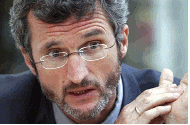“Ethics is Back” – Georg Kell about the Crisis, Climate Change and the Role of the Global Compact
Since the very beginning, Georg Kell has been Executive Director of the Global Compact. Due to his ongoing fervour the Global Compact today is fully integrated into the UN system. We spoke with Georg Kell about the economic crisis, the search for new confidence, and the renaissance of politics and ethics. His message is clear: We have to reward sustainable business models. And we have to take climate change much more seriously, or the future might be rough.
Mr. Kell, when the Global Compact was founded, the world was at the edge of the 21st Century. Since then, we have seen 9/11, questionable wars on terror and a financial and economic crisis of historic dimensions. Is the Global Compact prepared for such times?
Ten years ago, the Compact was launched primarily to provide legitimacy. That was before Seattle and other World Trade Organization events. Without a doubt, these issues are still important today. But it has now become very clear that we have entered a new era: the world is struggling to restore trust and confidence in order to return to growth and employment. We are seeing enormous government interventions and experiencing market shockwaves unlike any since the 1930s.
At the same time, we have to brace ourselves for the next systemic disruption: climate change. We completely agree with UN Secretary-General Ban Ki-moon’s position on sustainability in the 21st century. In his speech at this year’s World Economic Forum, he made it very clear that we need to take on both challenges at the same time: we need to restore trust and confidence, and we need to lay the foundation for more sustainable growth, which means greener growth.
Cynics say the present crisis shows that economics and ethics have nothing in common. How do you respond?
Ethics is back, values are back, and the search for long-term sustainability is more apparent than ever before! It may sound ironic, but the crisis has reinforced the search for values and ethics. The quarterly short-term thinking that prevailed for so long is slowly giving way to a more comprehensive, sustainable risk assessment. There is a fundamental lesson teaching us to focus on long-term value creation. Secondly, we have to come up with a more comprehensive risk paradigm, one which is adequate for interdependent growth and takes into consideration environmental, social and governance – ESG – issues. So, in a certain way, the crisis is playing into our hands. The growing need for the Global Compact may also be underscored by the fact that more than 200 companies have recently joined the Initiative, while others are rediscovering the value of engagement.
But you cannot deny that we have experienced many dubious practices in the markets...
The public has to distinguish among economic actors. Those entrepreneurs make investments, create employment and provide goods and services are as innocent of what has happened as most people are. Even in the financial sector, many parts were solid. What we see, if anything, is that the financial crisis started in the least regulated sub-categories of the financial system, among the so called “innovative product generators” of private equity funds and investment banks. Some of them are out of business now, and we welcome this. They stood for a lack of ethics, obsession with short-term profits and reckless behaviour. But it would be totally wrong to say that the whole private sector behaved unethically.
And what role does the Global Compact play?
What we presently see is a deficit of hope and stimuli for ideas and innovation. Through responsible behaviour, through deeper engagement in the Compact, you can make a contribution to restoring trust and confidence. Entrepreneurs can show that business is not just about surviving and cutting costs; they can also lead the way to a sustainable future by stressing innovation. All the government interventions right now will stimulate markets. But this is only an “incentive moment”. The true source of value creation is, of course, entrepreneurship. I’m convinced that, at the end of the day, we will come back to these economic fundamentals.

"Entrepreneurs can show that business is not just about
surviving and cutting costs; they can also lead the way to a
sustainable future by stressing innovation."
Geork Kell, UN Global Compact Executive Director
In Davos this January, PM Gordon Brown warned against “deglobalization”. In his words, this does not mean a romantic return to the “good ol’ times”, but an abrupt destruction of global interdependence with tremendous economic and social costs. Isn’t this in contradiction to the optimism of the Global Compact?
I share Gordon Brown’s view. I’m very concerned, too. If you ask me what the biggest threats are, I would respond populism at the country level; discrimination against everything that doesn’t come from the domestic market; and protectionism that rolls back all that we have established over the past decades. The multilateral global system has assured at least a minimum of fairness, and I have the hope that the politicians, in their wisdom, will not forget that humanity has had to learn several times and at great cost what it means to neglect an interdependent world. It would undermine our collective ability to create wealth, employment and hope. And it would also bring to an end the rapid diffusion of know-how, technology and solutions we urgently need in the fight against poverty and climate change.
Due to the crisis, we’re seeing a tremendous comeback of Keynesian policy. Will this affect the balance of power in the Global Compact?
Not yet, but I suspect it will very soon. I agree that the amount of government intervention we have seen over the past months is on a scale never before seen in the history of modern markets. I think there is both a risk and an opportunity in that. The risk is obviously that government interventions distort market performance and undermine competitiveness and lead to inward-orientation. That is the risk Gordon Brown mentioned at the World Economic Forum. A positive aspect could be, on the other hand, that governments recognize the opportunities that lie in collective responsibility and working together. They could use their interventions to accelerate the change processes we were talking about. They can set the right signals to reward responsibility and green growth.
In fact, politicians from Obama to Merkel say that we need a sustainable economy. Why is this so hard to achieve in everyday life?
Because we are lazy. We all dislike change, because it means making an effort. That is part of human nature. Over decades, we have got used to how prices are established, how institutions regulate and all the rest. We carry the whole legacy of the past with us, and now we realize that we need to change, for instance by putting different prices on certain products. How do you do that? It will be a painful adjustment process.
Can you give us an example?
No doubt, climate change and putting a clear price on greenhouse gas emissions will lead to major disruptions. There will be losers, because many companies are betting on the wrong horse. They didn’t adapt in time to be on the front edge of the change agenda. And, of course, these companies don’t like this kind of change and will try to preserve the status quo as long as possible. On winning side will be the many other companies that have already started to invest in a future where greenhouse gas emissions have market prices sufficiently high to encourage green investment and discourage harmful practices.
Do you really think that innovation alone can stop global warming?
The complexity of climate change is incredible, and the more you look at it, the more it scares you. Indeed, we are very late in the game. Maybe we are already too far behind. According to UN estimates, over 75 percent of all disaster events from 1988 to 2007 were climate-related and accounted for 45 percent of deaths and 80 percent of the economic losses caused by natural hazards. I don’t want to be a doomsday prophet, but we better get prepared for a rough future with major discontinuities. And it is not only an environmental issue Climate change affects all aspects of life: It is a social issue. It is a political issue. It is a security issue. It is becoming an overarching challenge that humanity has to cope with. So what can we do? In principle, the solution is simple: We just have to tax what is bad and reward what is good. The easiest solution would be a heavy tax on carbon emissions. That would stimulate innovation. Will this become a global movement, or not? Will politicians have the courage and the will to make that happen? That is the key question.
Do you think collective political action will be a realistic option for the Copenhagen Climate Summit?
I think so. We’re still baffled by how a regional housing crisis in the US could turn into a worldwide financial crisis leading to the biggest decline in the history of export-oriented economies, such as Korea or China, and to the possible breakdown of Ukraine and some other eastern European countries. So, the message to governments is that we all live in a very closely connected world. Even more so when it comes to climate change. Therefore, the world needs to move to a proactive risk management, and there’s a stronger need for cooperation than ever before. I was pleased to read about the European debates on how to deal with the crisis in the eastern part of the European Union. This may bring more coherence to Brussels' policy. Another example is China, which is now more proactive on the climate agenda. They understand the urgency to act, especially domestically, because their water and land are polluted, and the prospects of natural disasters are dramatic.
Why is a successful Copenhagen Climate Summit so important?
We need a successful COP 15 for many reasons. Imagine if COP15 were a failure and individual regions and countries would pursue their own way of putting a price on carbon emissions! That would lead to a patchwork of disjointed approaches, which ultimately would put enormous pressure on the trading and investment systems. No doubt it would lead to protectionism and cause major disruptions of economic growth.
...and what role can the business sector play?
I’m personally convinced that investment and commerce offer the best opportunities to spread technology and know-how. Supply chains are the most effective way to diffuse clean technology. No government bureaucracy can ever spread technology on the same scale and at the same speed as the private sector.
Thank you very much!
Georg Kell is Executive Director, United Nations Global Compact
About Us // Privacy Policy // Copyright Information // Legal Disclaimer // Contact
Copyright © 2012-2018 macondo publishing GmbH. All rights reserved.
The CSR Academy is an independent learning platform of the macondo publishing group.









